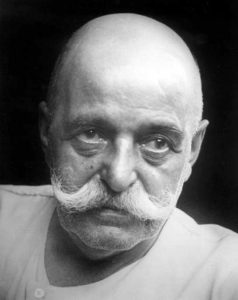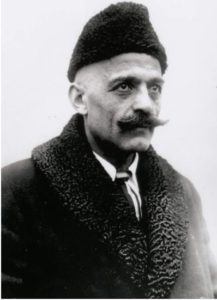G.I.Gurdjieff
Gurdjieff was born in 1866 (?) in Alexandropol of Caucasus Pontus to Greek parents (Ioannis Georgiadis and Evdokia Eleftheriadis). His life was episodic. In his youth, after having spent time studying medicine, he wandered in the Middle and Far East for twenty whole years, reaching monasteries and holy places inaccessible to the Western traveller. There he met spiritual teachers from different religious traditions. Upon his return to the West, before World War I, students gathered around him in Moscow and St. Petersburg. With the Russian Revolution he left Russia and continued his work traveling to Tbilisi, Istanbul, Berlin and London. In 1922 he settled in the Chateau de Prairie, near Paris, where he was discreetly approached by a large number of students from all over the world. He died in 1949 in Paris.

From the time he appeared in Moscow in 1912 until his last days in 1949, George Georgiadis, as was Gurdjieff’s original name, seems to have been moving under the persistent urge to transmit to his students a vast system of Practical Philosophy, and establish it as a coherent global Teaching. His work is amazing. Director Peter Brook, who made the film Meetings with Remarkable Men about Gurdjieff’s early life and youthful adventures, describes him as “the most authentic human being of the modern world.”
Gurdjieff is a philosopher in the old sense, in the way that Plato and Pythagoras were. He gave substance to a multitude of great ideas, creating a philosophical approach to life that seems to meet the need of modern man to understand both the eastern and ways of describing reality, both the conclusions of modern science and wisdom of ancient tradition. The main axis of his thinking is addressed to the possibility that one can “work on oneself” to develop Consciousness, that is, develop the way one understands him/herself and the reality around him/her.
What he says is not easy to digest. He asserts that people “live their lives in sleep”, that their intents and the lofty ideas they profess have nothing to do with their actions, and that, as a result, history is a flow of random and incoherent events, the result of people’s unconscious behaviour. What is called “progress”, he believed, is the advancement of technology, which proceeds automatically, as one new invention brings about the next one. But Gurdjieff’s view of mankind moved beyond this “cacophony of muddled general intents and purposes”, seeing the possibility of “harmonious development” as man’s personal opportunity, not as a predetermined mass, social goal. The path for development is spiritual, he proclaims, and it is “private”. It concerns the necessary individual effort that man must exert to develop consciousness within himself, in himself. “Working on oneself” is about realizing what it is that one may do as he participates in the mechanical flow of society, inescapably adhering to the universal material Laws of Nature.
For Gurdjieff, mindful practice is the beginning and the end of all possible action. Many words are unnecessary, even suspicious. “I teach,” he declared teasingly, “that when it rains, the streets are wet.” The practice he proposes focuses on continuous baptism in experience, with the aim of understanding the truth about oneself. Nevertheless, in actuality this proves to be not as easy as it may sound.
Beside his insistence on practice, Gurdjieff provided a complete, rigorous scientific picture of how the human Brain and Mind work, which was described by Jung’s student Maurice Nicoll as the “most comprehensive picture of human psychology that was ever presented”. His ideas shocked the French philosopher Phillip Mairet to such an extent that, without being his student, he declared that “no system of philosophy from what has been published in the modern world can be compared in strength and complete articulation to Gurdjieff’s thought.” Many believe that his ideas will thus contribute to the emergence of a new way of thinking, which seems to be so much needed. The difficulty to implement this is that his teaching loses its meaning if it is not accompanied by the rigorous practice of “working on oneself”. It is most difficult to see beyond the collective fantasies of our society, which, invertedly, seem to erode every new generation of the usual theoretical well-wishers.
The way Gurdjieff transmitted his ideas went through different phases. In the first period in Russia, he used language so clear that he left no doubt about the content of his thought. At that time Ouspensky, one of his main students, recorded Gurdjieff’s ideas in his book In Search of the Miraculous.
Later, in France and America, he used a more allegorical language and an extremely more complex practical methodology. At the same time, the gift he had to teach even without words emerged: He taught with diagrams and symbols, but he also taught through his music, through the sacred dances he showed to his students, which made the “Movements” one of the bases of his teaching. He taught in the way he set up profitable businesses, in the way he cooked and set his table for dozens of friends and acquaintances at a time.
His emotional world shone during the German occupation, when with the daily secret meals that he regularly distributed in his neighbourhood, he saved from hunger over thirty poor elderly people.
When liberation came, and until his death five years later, students, many of them famous, gathered there from all over the world, supporting him and his teaching.
In his epic work “Everything and Everything”, Gurdjieff gives wonderful myths about the creation and maintenance of the world, often full of poignant humour. It is difficult to guess how much he “believed” in these myths. It suffices, however, to observe that, on their symbolic level, he projected his deepest knowledge which leaves one astonished, when he realizes how much his “Tales” are in accordance with current scientific views and modern theories, containing scientific data which were unknown in his time. In this respect, Gurdjieff and the sources of his knowledge remain an enigma.

According to Gurdjieff, what is “sacred” is here, it is within our world, within our very material universe. His work goes to great depth, connecting the laws of the universe with observations on the anatomy of the human body and psychology. His ideas are a philosophical model perfectly compatible with today’s science while, at the same time, in some areas, it goes much further than that. It is a comprehensive view of the world that not only does not exclude but, on the contrary, strongly emphasizes the need for the dimension of spiritual practice in our daily lives.
Ultimately, his great contribution perhaps lies in the fact that he showed that the spiritual and the scientific views of the world, not only should they not compete with each other, but that they are both necessary to give a meaningful answer to the question “who am I?” and “what is it that I have to do in life?”


